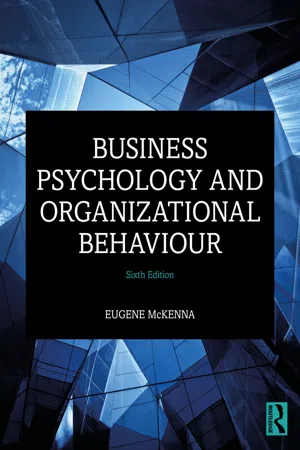
- 978 pages
- English
- ePUB (mobile friendly)
- Available on iOS & Android
Business Psychology and Organizational Behaviour
About this book
Business Psychology and Organizational Behaviour introduces principles and concepts in psychology and organizational behaviour with emphasis on relevance and applications. Well organised and clearly written, it draws on a sound theoretical and applied base, and utilizes real-life examples, theories, and research findings of relevance to the world of business and work.
The new edition of this best-selling textbook has been revised and updated with expanded and new material, including: proactive personality and situational theory in personality; theory of purposeful work behaviour; emotional and social anxiety in communication; decision biases and errors; and right brain activity and creativity, to name a few. There are numerous helpful features such as learning outcomes, chapter summaries, review questions, a glossary, and a comprehensive bibliography. Illustrations of practice and relevant theory and research also take the reader through individual, group, and organizational perspectives.
This is an essential textbook for undergraduates and postgraduates studying psychology and organizational behaviour. What is more, it can be profitably used on degree, diploma, professional, and short courses. It's also likely to be of interest to the reflective practitioner in work organizations.
Frequently asked questions
- Essential is ideal for learners and professionals who enjoy exploring a wide range of subjects. Access the Essential Library with 800,000+ trusted titles and best-sellers across business, personal growth, and the humanities. Includes unlimited reading time and Standard Read Aloud voice.
- Complete: Perfect for advanced learners and researchers needing full, unrestricted access. Unlock 1.4M+ books across hundreds of subjects, including academic and specialized titles. The Complete Plan also includes advanced features like Premium Read Aloud and Research Assistant.
Please note we cannot support devices running on iOS 13 and Android 7 or earlier. Learn more about using the app.
Information
PART I
PERSPECTIVES AND ENQUIRY
CHAPTER ONE
1 HISTORICAL INFLUENCES AND RESEARCH METHODOLOGY
CONTENTS
- Assess the role played by psychology in the analysis and solution of organizational problems.
- Draw a distinction between the different traditions or schools of thought in psychology and assess their significance.
- Explain what is meant by the multidisciplinary nature of organizational behaviour, and comment on the standing of psychology as a contributory discipline.
- Examine the different approaches used by theorists and practitioners in the study of organizational behaviour over time.
- Assess the changes in the external environment that have brought about fundamental changes to organizational functioning in recent years.
- Identify the role of research in the social sciences and examine the significance of the scientific method.
- Examine the different techniques available to the researcher when investigating issues or problems in organizations, and acknowledge the significance of ethics.
INTRODUCTION
NATURE OF PSYCHOLOGICAL PERSPECTIVE
Different approaches
Psychoanalysis
Behaviourism
Phenomenology
Cognitive
- Psychoanalytical research has been initially ignored by mainstream scientific psychology over the past several decades.
- Behavioural psychology has declined in prominence and it gave way to the ascension of cognitive psychology during the 1970s.
- Cognitive psychology has sustained a steady upward trajectory and continues to be the most prominent school.
NATURE OF ORGANIZATIONAL BEHAVIOUR
| Discipline | Focus |
|---|---|
| | |
| Psychology | Individual, group, organizational development, occupational psychology techniques |
| Sociology | Organizational analysis |
| Anthropology | People's relationship with their environment (e.g. culture) |
| Political science | Activity connected with the acquisition of power, engaging in political activity, existence of vested interests, conflict generation and resolution, coalition formation |
| Economics | Economic policy, firm as an economic entity, nature of labour markets, human resource planning |
| Industrial engineering | Time and motion study and work measurement |
| Medicine | Occupational stress and employee well-being |
Table of contents
- Cover
- Half Title
- Title Page
- Copyright Page
- CONTENTS
- Preface
- Acknowledgements
- PART I PERSPECTIVES AND ENQUIRY
- PART II THE INDIVIDUAL
- PART III THE GROUP
- PART IV THE ORGANIZATION
- Glossary
- References
- Name Index
- Subject Index